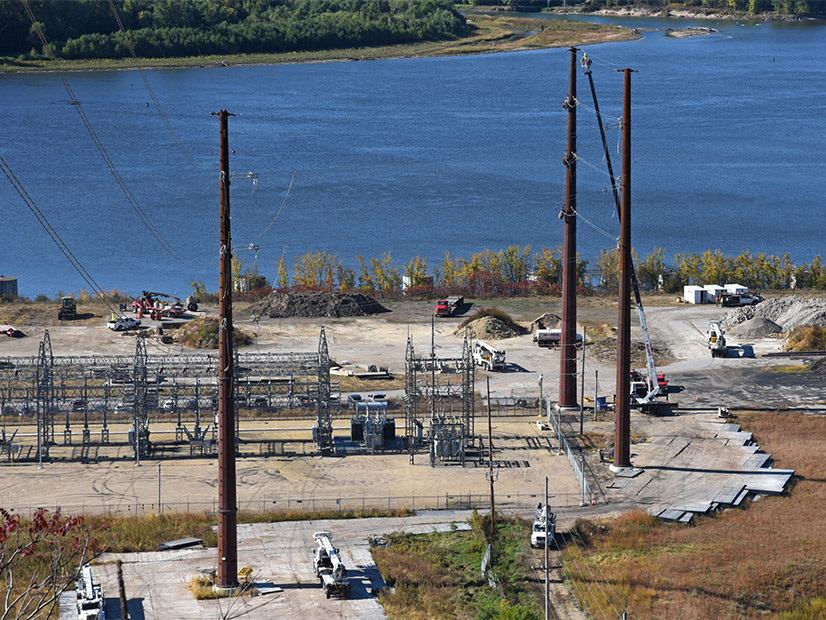A transmission project that MISO approved 12 years ago cleared another legal hurdle Monday when a Wisconsin county judge found that regulators adequately scrutinized the project nearly four years ago.
Dane County Circuit Court Judge Jacob Frost upheld the Wisconsin Public Service Commission’s 2019 decision to issue a certificate of public convenience and necessity for the Cardinal Hickory Creek project, a 102-mile, 345-kV transmission line (2019CV003418).
The ruling does not affect last year’s U.S. district court decision, finding that federal agencies violated federal law when they cleared the line to route through the Upper Mississippi River National Fish and Wildlife Refuge. The decision halted construction on one segment of the line and is currently on appeal in the Seventh Circuit U.S. Court of Appeals. (See Federal Judge: Tx Line Can’t Cross Wildlife Refuge.)
Cardinal-Hickory Creek is one of the 17 Multi-Value Projects MISO approved as a $5-billion portfolio in 2011. The line is projected to facilitate the connection of nearly 20 GW of renewable energy, but it has been mired in litigation for more than a decade.
Frost said the Driftless Area Land Conservancy and two Wisconsin counties’ challenge to the PSC’s approval “largely boil down to disagreements with the PSC’s conclusions and decisions regarding the disputes of fact.” He said state regulators didn’t err in their decision to grant the certificate; adequately weighed competing evidence and explained their decision; properly determined that an environmental impact statement satisfied the state’s Environmental Policy Act; and did not shift the burden of proof to opponents of the line.
Regulators, not the courts, determine energy policy, Frost said.
“Though they couch the arguments as the PSC decision lacked substantial evidence, when examined more closely, petitioners are actually saying the PSC should not have believed the evidence applicants submitted and should have given greater weight to the evidence petitioners or PSC staff provide,” he wrote. “However, the court cannot second-guess the PSC as to weight and credibility of evidence. Because the PSC’s decision relied on substantial evidence, I must affirm.”
Frost said though he understood the “massive impacts” the project holds for Wisconsin, the PSC “properly conducted itself.”
The Cardinal-Hickory Creek owners, American Transmission, ITC Midwest and Dairyland Power Cooperative, said they were “extremely pleased” with the ruling.
“The judge’s decision reinforces that Cardinal-Hickory Creek is a critical, backbone project for the regional power grid within the Upper Midwest,” the companies said in a joint statement.
Mixed Responses
Jennifer Filipiak, executive director of the Driftless Area Land Conservancy, said the group was disappointed with the decision to uphold the PSC’s approval of the line. She said state regulators “failed to fully and fairly consider less-damaging alternatives to the Cardinal-Hickory Creek transmission line.”
“We remain committed to protecting the unique landscape of the Driftless Area and working to enhance its health and diversity. We are considering next steps and actions,” Filipiak said in a statement.
Wisconsin Wildlife Federation Executive Director Mark LaBarbera said his organization was similarly dissatisfied with the ruling. He said the PSC failed to “look more seriously” at potential alternatives and said that the line’s costs are already more expensive than original estimates.
“The company reported it has spent more than $530 million on this unfinished project, already exceeding its original $492 million total estimate,” LaBarbera said. “The dramatic cost increase makes clear why it’s essential to thoroughly study and consider alternatives before starting to build large projects that will damage Wisconsin’s natural environment. We are considering next steps and actions.”
Environmental Law & Policy Center senior attorney Brad Klein, who represented both conservation groups, said he is considering filing an appeal. He noted that the state decision does not impact the 2022 federal decision.
Clean Grid Alliance, Fresh Energy, and the Minnesota Center for Environmental Advocacy applauded the decision in a joint press release. They said that with the ruling, they’re “one step closer” to completing construction the project’s final leg so it can move forward and enable 115 renewable generation projects.
“We have been needing — and waiting — for this line for 12 years. And in that time, our society’s demand for clean electricity has grown even greater,” Clean Grid Alliance Executive Director Beth Soholt said. “Several states have enacted clean energy goals since 2011. That means we need this line — and much more — to meet their carbon reduction goals and improve the reliability of the grid to boot. There is great demand on our electric grid these days, so seeing Cardinal-Hickory Creek get across the finish line is a huge win.”
Amelia Vohs, regulatory attorney for the Minnesota Center for Environmental Advocacy, said the line is “well-designed and well-vetted to minimize its environmental impact, and its construction will result in reduced greenhouse gas emissions and more clean, renewable energy in the Midwest.”
“Everyone says they want a clean energy economy, but to get there we need transmission. You can’t have one without the other, and there is no time to waste,” Soholt said.
She noted that MISO’s first tranche of four long-term transmission portfolios, a $10 billion package approved last year, shows the need for transmission is only intensifying.




